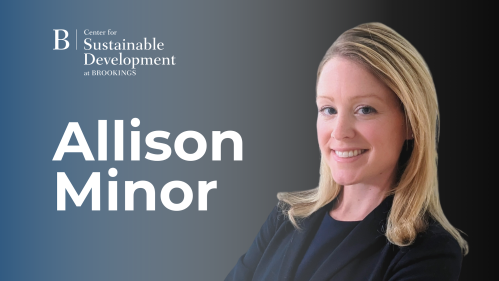U.S. Secretary of State Hillary Clinton just announced that she will attend the upcoming High-Level Forum on Aid Effectiveness in Busan, South Korea. Although this event will be the fourth such forum – following on Rome (2003), Paris (2005) and Accra (2008) – it will be the first time the U.S. is represented at such a high level.
We view Clinton’s attendance as a positive step, having made the case for it privately in meetings and openly in publications (see our policy paper and this recent brief). But how does her attendance fit into the context of reforms to elevate global development within the U.S. government? And how can her participation lead to a better High-Level Forum? Here are some of our thoughts:
The Quadrennial Diplomacy and Development Review (QDDR), issued at the end of 2010, focused in part on how the State Department can play a role in elevating development within U.S. foreign policy. It explicitly states:
“Elevating development as a core pillar of U.S. foreign policy requires not just rebuilding USAID into the world’s premier development institution, but also transforming the Department of State to support development. Secretary Clinton recognizes that while diplomacy and development are each critical in their own right, when they work together they are the basis on unrivaled civilian power to advance U.S. interests. For too long, however, the Department of State has not always been a willing and capable partner for USAID in supporting the development pillar of our foreign policy.”
The review goes on to note that State should systematically use diplomacy to advance development by negotiating and promoting international policy agreements in the context of multilateral forums in a way that complements USAID rather than treading on that agency’s expertise.
The transformation of the State Department to better support development makes many development assistance advocates and close observers nervous about further absorption and instrumentalization of operational assistance programming into the toolkit of diplomacy. The construct of the three “D’s” – development, diplomacy and defense – as distinct pillars of U.S. national security and foreign policy can quickly morph into a two-dimensional frame that blurs diplomacy and development while setting them apart from military efforts. Given USAID’s recent history of eroded independence, this is a legitimate concern especially with regard to increased roles for the State Department in operational aid programs and aid budget management.
But there are many ways the State Department can support development by drawing on its comparative advantages. For example, in conflict-affected states where an international military presence is required, State can use its expertise and influence with other departments, governments and international organizations to shape coherent stabilization efforts that are conducive to development.
A more obvious comparative advantage is the international prominence of the Secretary of State, which should be put to good use in Busan. So while USAID should naturally continue to lead in shaping U.S. positions for Busan— after all it’s a global development conference — Clinton’s participation should enable the U.S. to leverage her unique profile on the global stage. As one of us previously noted in reference to the OECD ministerial meeting in May 2011, “Secretary Clinton must continually use development diplomacy opportunities to empower USAID and its administrator, Rajiv Shah, in the eyes of other U.S. government and international officials. Secretary Clinton is certainly capable of using her star power in this way, but will she?”
With regard to the High-Level Forum itself, Secretary Clinton’s commitment to attend is already serving as a game-changer that could snatch a politically meaningful result from the jaws of an otherwise technocratic aid conference. Six years ago in Paris, at an earlier conference on aid effectiveness, rich countries committed themselves to make changes in the way they delivered aid to improve its impact. They have made some progress on this and the efforts are contributing to better development results, but the pace has been slow. As panelists at a recent Brookings conference argued, this is mostly because the necessary improvements in aid delivery require tough political support. In essence, the reforms would transfer more control over resources to beneficiaries in return for greater accountability on results. Persuading Congress and the public that that is a sensible approach to improving the “bang-for-the-buck” for U.S. taxpayers is essentially a political issue.
Busan will be a political event in other ways as well. There are now many international forums that deal with development in overlapping ways, including the United Nations and the G-20, and many more providers of development cooperation, including China and other emerging economies. Busan must reposition the aid industry to work better in this environment, taking the discussions beyond aid into a more systematic “development effectiveness” agenda. The attendance of Secretary Clinton, and the other foreign ministers who will now be encouraged to attend, can signal that this repositioning is underway. Maybe then new forms of aid partnerships can be built, including with the private sector, so that aid and other instruments of development cooperation can catalyze and accelerate improved living standards in the poorest parts of the world.
Lastly, as one of the world’s strongest voices on greater investment in women and girls, Secretary Clinton’s participation provides a new opportunity to add a focus on gender to the development agenda at Busan.
The Brookings Institution is committed to quality, independence, and impact.
We are supported by a diverse array of funders. In line with our values and policies, each Brookings publication represents the sole views of its author(s).



Commentary
Hillary Clinton to Attend Busan Forum: Demonstrating Development Diplomacy?
September 21, 2011